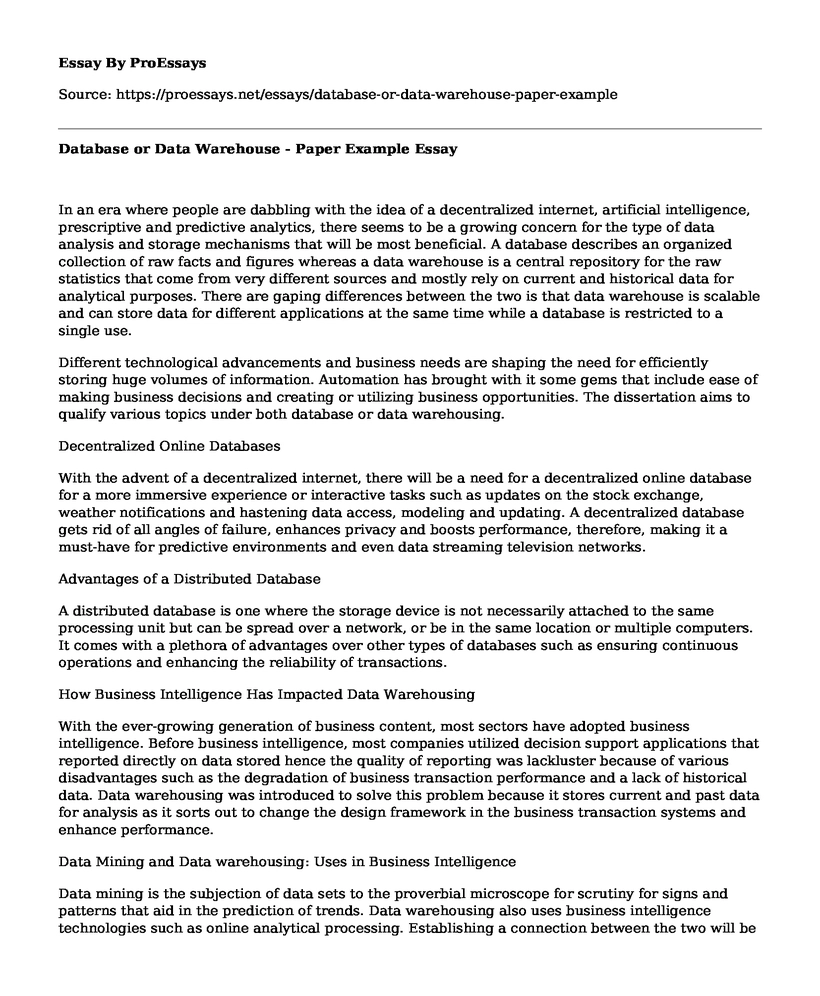In an era where people are dabbling with the idea of a decentralized internet, artificial intelligence, prescriptive and predictive analytics, there seems to be a growing concern for the type of data analysis and storage mechanisms that will be most beneficial. A database describes an organized collection of raw facts and figures whereas a data warehouse is a central repository for the raw statistics that come from very different sources and mostly rely on current and historical data for analytical purposes. There are gaping differences between the two is that data warehouse is scalable and can store data for different applications at the same time while a database is restricted to a single use.
Different technological advancements and business needs are shaping the need for efficiently storing huge volumes of information. Automation has brought with it some gems that include ease of making business decisions and creating or utilizing business opportunities. The dissertation aims to qualify various topics under both database or data warehousing.
Decentralized Online Databases
With the advent of a decentralized internet, there will be a need for a decentralized online database for a more immersive experience or interactive tasks such as updates on the stock exchange, weather notifications and hastening data access, modeling and updating. A decentralized database gets rid of all angles of failure, enhances privacy and boosts performance, therefore, making it a must-have for predictive environments and even data streaming television networks.
Advantages of a Distributed Database
A distributed database is one where the storage device is not necessarily attached to the same processing unit but can be spread over a network, or be in the same location or multiple computers. It comes with a plethora of advantages over other types of databases such as ensuring continuous operations and enhancing the reliability of transactions.
How Business Intelligence Has Impacted Data Warehousing
With the ever-growing generation of business content, most sectors have adopted business intelligence. Before business intelligence, most companies utilized decision support applications that reported directly on data stored hence the quality of reporting was lackluster because of various disadvantages such as the degradation of business transaction performance and a lack of historical data. Data warehousing was introduced to solve this problem because it stores current and past data for analysis as it sorts out to change the design framework in the business transaction systems and enhance performance.
Data Mining and Data warehousing: Uses in Business Intelligence
Data mining is the subjection of data sets to the proverbial microscope for scrutiny for signs and patterns that aid in the prediction of trends. Data warehousing also uses business intelligence technologies such as online analytical processing. Establishing a connection between the two will be the juicy morsel of the research because business intelligence technologies use historical and predictive aspects of business day to day operations, data warehousing analyses the past, current and predictive data and mining used whenever a party wants to decipher its data.
References
Anon (n.d.) Is Data Warehousing Essential to Business Intelligence? [online]. Available from: http://searchdatamanagement.techtarget.com/news/1280097459/Is-Data-Warehousing-Essential-to-Business-Intelligence (Accessed 6 February 2018).
10156167252920316 (2017) Databases of the Future Will be Decentralized Hacker Noon [online]. Available from: https://hackernoon.com/databases-of-the-future-will-be-decentralized-d6d9887c494e (Accessed 6 February 2018).
Anon (2018) Distributed database [online]. Available from: https://en.wikipedia.org/wiki/Distributed_database (Accessed 6 February 2018).
Anon (2018) The Decentralized Web Just Might Need Databases, Too [online]. Available from: https://www.coindesk.com/decentralized-web-just-might-need-databases/ (Accessed 6 February 2018).
Anon (n.d.) Database vs. Data Warehouse: A Comparative Review [online]. Available from: https://www.healthcatalyst.com/whitepaper/database-vs-data-warehouse-a-comparative-review/2/ (Accessed 6 February 2018).
Anon (2018) Business intelligence [online]. Available from: https://en.wikipedia.org/wiki/Business_intelligence (Accessed 6 February 2018).
Anon (2018) Decentralized Public Smart Database Ties.DB to Solve Soaring Problems in Data Storage CoinSpeaker [online]. Available from: https://www.coinspeaker.com/2018/02/06/decentralized-public-smart-database-ties-db-solve-soaring-problems-data-storage/ (Accessed 6 February 2018).
Cite this page
Database or Data Warehouse - Paper Example. (2021, Sep 01). Retrieved from https://proessays.net/essays/database-or-data-warehouse-paper-example
If you are the original author of this essay and no longer wish to have it published on the ProEssays website, please click below to request its removal:
- Essay on Communication in a Digital Age
- Challenges of Security Department Speech Paper Example
- Essay on Information Systems: Transforming and Enhancing Business Outcomes
- Identity in Virtual World
- Essay on Nursing Informatics: Roles of a Nursing Leader in Data Analysis & Quality Care
- Paper Sample on Technology: Key to Organizational Success Through Information Systems
- Paper Sample on Vulnerability Assessment: Identifying Network Security Weaknesses







